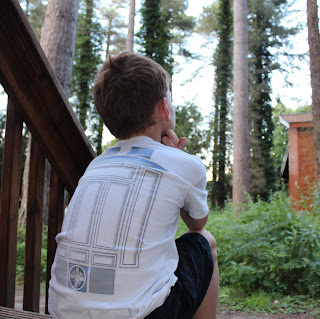There is lots going on during the holidays, routines are thrown out of wack and he's learning a new vocabulary for the time too. Now more then ever docs ions on key or core words are essential. While it's chaotic and busy I need to help him say what he wants without over complicating it. If he's able to sign 'want gingerbread man' then he's doing ok. I can encourage him to sign 'I want gingerbread man please' but only because I know he understands these terms. It's not going over the top. It's more important that he has his key or core words right and getting them in the right order help too. Otherwise things can be mislabelled without you noticing. The last thing I want is for David to think a gingerbread man is actually a 'gingerbread manplease' because I'm not focuses on key words.
Thankfully, he's not lost his head yet... Although several gingerbread men have!
Tomorrow: Last idea before school starts again on Monday
Yesterday: Ask real questions
Notes: Thanks for reading Baubley babbles, my notes on helping my family talk over Christmas. My sons are both on the autistic spectrum and we have a two year old daughter. Our son, David is five years old and uses a variety of Augmented and Alternative Communication (AAC) to talk. Every school day till school restarts I'll post a one thing I'll be keeping in mind to help us all communicate over the festive holidays. Maybe some things will be of interest to you too.
Notes: Thanks for reading Baubley babbles, my notes on helping my family talk over Christmas. My sons are both on the autistic spectrum and we have a two year old daughter. Our son, David is five years old and uses a variety of Augmented and Alternative Communication (AAC) to talk. Every school day till school restarts I'll post a one thing I'll be keeping in mind to help us all communicate over the festive holidays. Maybe some things will be of interest to you too.











